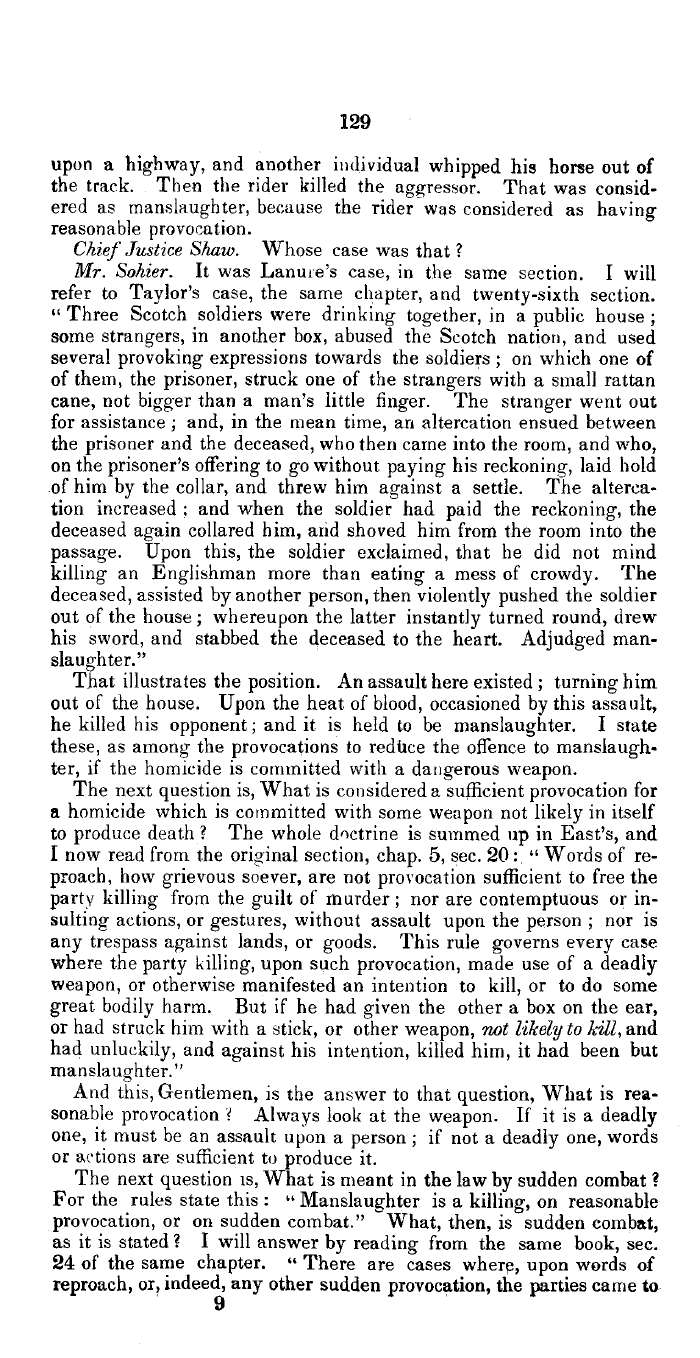|
129
upon a highway, and another individual whipped his horse out of
the track. Then the rider killed the aggressor. That was consid-
ered as manslaughter, because the rider was considered as having
reasonable provocation.
Chief~Justice Shaw. Whose case was that?
Mr. Sohier. It was Lanure's case, in the same section. I will
refer to Taylor's case, the same chapter, and twenty-sixth section.
'° Three Scotch soldiers were drinking together, in a public house ;
some strangers, in another box, abused the Scotch nation, and used
several provoking expressions towards the soldiers ; on which one of
of them, the prisoner, struck one of the strangers with a small rattan
cane, not bigger than a man's little finger. The stranger went out
for assistance ; and, in the mean time, an altercation ensued between
the prisoner and the deceased, who then carne into the room, and who,
on the prisoner's offering to go without paying his reckoning, laid hold
of him by the collar, and threw him against a settle. The alterca-
tion increased ; and when the soldier had paid the reckoning, the
deceased again collared him, arid shoved him from the room into the
passage. Upon this, the soldier exclaimed, that he did not mind
killing an Englishman more than eating a mess of crowdy. The
deceased, assisted by another person, then violently pushed the soldier
out of the house; whereupon the latter instantly turned round, drew
his sword, and stabbed the deceased to the heart. Adjudged man-
slaughter."
That illustrates the position. An assault here existed; turning him
out of the house. Upon the heat of blood, occasioned by this assault,
he killed his opponent; and it is held to be manslaughter. I state
these, as among the provocations to reduce the offence to manslaugh-
ter, if the homicide is committed with a dangerous weapon.
The next question is, What is considered a sufficient provocation for
a homicide which is committed with some weapon not likely in itself
to produce death ? The whole dnctrine is summed up in East's, and
I now read from the original section, chap. 5, sec. 20: 1° Words of re-
proach, how grievous soever, are not provocation sufficient to free the
party killing from the guilt of murder; nor are contemptuous or in-
sulting actions, or gestures, without assault upon the person ; nor is
any trespass against lands, or goods. This rule governs every case
where the party killing, upon such provocation, made use of a deadly
weapon, or otherwise manifested an intention to kill, or to do some
great bodily harm. But if he had given the other a box on the ear,
or had struck him with a stick, or other weapon, not likely to kill, and
had unluckily, and against his intention, killed him, it had been but
manslaughter."
And this, Gentlemen, is the answer to that question, What is rea-
sonable provocation ? Always look at the weapon. If it is a deadly
one, it must be an assault upon a person ; if not a deadly one, words
or actions are sufficient to produce it.
The next question is, What is meant in the law by sudden combat ?
For the rules state this : 11 Manslaughter is a killing, on reasonable
provocation, or on sudden combat." What, then, is sudden combat,
as it is stated ? I will answer by reading from the same book, sec.
24 of the same chapter. " There are cases where, upon words of
reproach, or, indeed, any other sudden provocation, the parties came to.
9
|

